
You’ve established your initial web presence and have an SEO strategy in place. There’s some steady traffic, and you’re even picking up some leads. Your job’s done, right? Not quite.
You see, it’s not that simple. Effective SEO is an ongoing process that takes consistent work.
Even if you’ve hit your key milestones and you’re where you want to be in the SERPs, that doesn’t mean there isn’t still room for improvement and that you don’t need to adapt. Especially when the competitive landscape is ever-changing.
Semantically-related keywords, image optimization, predictive search, and Google Analytics 4 are just some of the factors shaping SEO as we know it. In addition to these trends and developments, there are many other reasons why you should keep working on your SEO strategy.
In this piece, I detail why SEO is a continuous process. It’s not something that you can afford to ignore once you start seeing results.
Let’s get started with the first reason.
1. There’s More Than One Type of Effective SEO Strategy
There’s more than one type of SEO, and an effective SEO strategy covers each type. In digital marketing, we divide SEO into four separate categories:
- On-page SEO optimizes a website’s content and structure to rank higher in the SERPs. On-page SEO includes optimizing the title and header tags, meta descriptions, images, and other elements affecting how a website ranks.
- Off-page SEO includes building backlinks to your site from other websites. The more high-quality backlinks a website has, the higher it ranks in SERPs, increasing your website’s authority and standing.
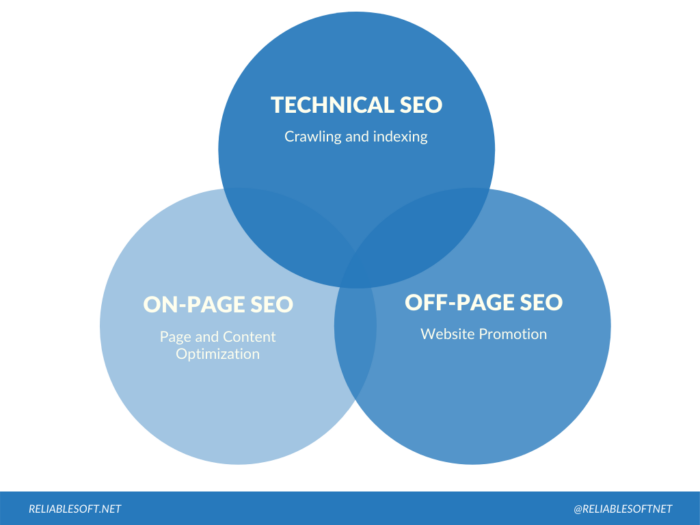
- Local SEO helps to ensure that your website appears near the top of search engine results pages for relevant queries in your area. You can do several things to improve your local SEO, such as filling out your Google My Business profile. This free service from Google allows businesses to create and manage their business listing on Google.com and other Google services such as Maps and Search.
A great example of local SEO is the legal firm, Hasbrook & Hasbrook. It’s got a first-page ranking in the SERPs, attracting nearly 10,000 monthly searches for Oklahoma-centered keywords. It’s done this by using local keywords in its page titles and website URL, publishing local law content, and optimizing its Google My Business page.
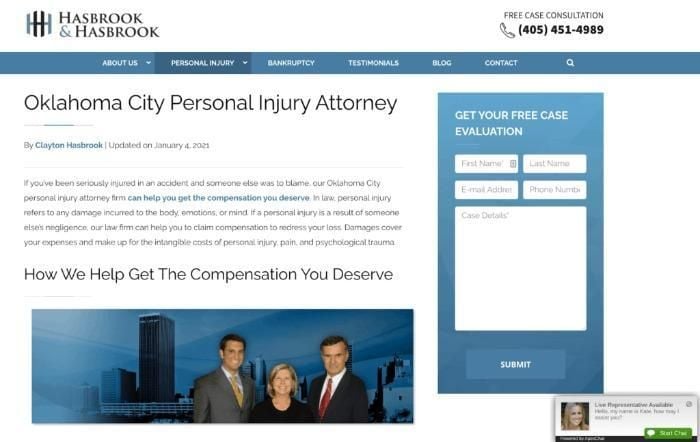
- Enterprise SEO is a large-scale method of SEO. It considers your business goals, target audience, and competition. It uses multiple optimization strategies and usually covers websites with high volumes of transactions or large amounts of published data.
Even if you don’t have time for a complete SEO overhaul, you can implement a minimalist SEO plan by following these six simple steps.
2. Your Competitors Aren’t Stopping
If you’re thinking about giving up on your SEO strategy, you can guarantee your competitors aren’t.
Effective SEO takes time. You might see an initial boost in your SERPs when you begin putting your plan into action. However, for the most part, you’re in it for the long haul, and you won’t see results instantly.
Your competitors understand this, and they keep testing. If you’re not doing the same, you’re giving your competitors an open way to outrank you.
Additionally, to ensure their SEO strategy is as effective as possible, you can bet your rivals are tweaking and implementing new processes as the search engines update and evolve, leading me nicely to the next section.
3. Google’s Algorithm Changes and Evolves
Google is constantly changing and evolving its algorithm.
As seen with the helpful content update that has started rolling out in August of 2022.
Some of these changes are small, while others are more significant. Remember Panda and Penguin? These two updates sent many website owners into a tailspin when Google introduced them.
Panda emphasized quality content, while Penguin penalized sites using shady backlinking techniques and keyword stuffing. Inevitably, however, many legitimate website owners got caught up in this, causing them to lose out in the SERPs.
Then, another update, Hummingbird, considered searchers’ intent, while the Pigeon update impacted local SEO.
However, it’s not just the major updates you need to consider. It’s the constant tweaking, up to twice a day, you need to be aware of.
While not all these ever-evolving algorithms significantly impact SERPs, staying up-to-date on the latest Google algorithm news is essential so you can adjust your SEO strategy accordingly.
4. New Content You Create Still Needs Optimization
You know that awesome fresh content you keep creating? Well, it’s not enough on its own.
If you want your articles to attract organic results and reach your ideal customers, then you need to optimize each piece.
While there’s no denying the part social media plays in getting traffic to your pages, search engines deliver much more. One survey shows that Google drives eight times more traffic than all the social media sites combined, and the average top blog gets 66.47 percent of traffic from search engines.
With content optimization, what should you focus on the most?
Aside from keywords, an assessment of content using the Semrush SEO Writing Assistant tool showed that the top-performing articles measured a perfect score for:
- SEO
- Tone of voice
- Readability
- Originality
You can further optimize your content with:
- Interlinking
- Managing keyword density and including semantically-related keywords
- Focusing on technical elements like meta tags
- And covering topics in-depth
Let’s move on to search intent.
5. Search Intent Can Change Over Time
Searchers’ intent can change over time, significantly impacting how your website ranks on in the SERPs.
When John Shehata, VP of Condé Nast, asked Google’s John Mueller what the search engine views as a valid query, Mueller came back with this :

From that, let’s go with the theory that search intent can often be seasonal.
Now, imagine you’re a hotel owner.
It’s summer, your business is booming because people are looking for somewhere to stay near the beach during their vacations. So naturally, they search for something like a ‘beach hotel (location).’ In all likelihood, they’re looking for a place to stay close to the beach in their chosen hotel.
However, come wintertime, your business slows down because people aren’t looking for beach getaways. An effective SEO strategy considers these seasonal changes in search intent and adapts its plan accordingly. For example, you might change your keywords to ‘seasonal short breaks’ (location) or similar.
Obviously, you would do some keyword research to determine the exact phrases to use, and I’ve got a tool to help you with that to give me some ideas to run with:
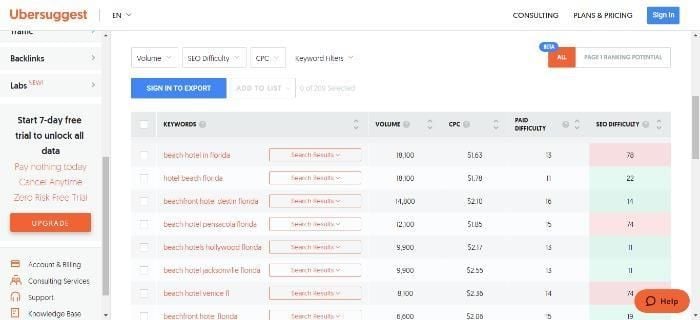
6. Effective SEO Compliments Paid Marketing and Other Efforts
You shouldn’t just think about SEO in isolation.
Effective SEO is part of an overall strategy designed to optimize your results. When you use SEO alongside paid marketing, outreach, and other efforts, you get a balanced online marketing plan that delivers short-term and long-term results.
Ideally, you want to use SEO alongside PPC advertising. Here’s why:
- SEM instantly boosts your traffic through targeted ads, while SEO is a slow-burner, taking up to a year to pay off.
- SEO can increase the effectiveness of your PPC campaigns by targeting the right audience and increasing click-through rates.
- By improving your website’s ranking in search engine results pages (SERPs), you can drive more qualified traffic to your site.
- SEO can help you target users who are already interested in what you have to offer, resulting in a higher conversion rate.
- Paid search and SEO work together to create a comprehensive online marketing strategy to help you achieve your business goals.
- SEO can help you create quality content that attracts attention online. This content can be used for paid advertising campaigns, resulting in more leads and sales.
7. Effective SEO Still Drives Results
You can find countless articles online declaring ‘SEO is dead.’ Some of these articles go back to 2012 and beyond, and they’re all saying the same thing. However, I can tell you something with confidence: They’re wrong!
SEO is alive and well, but like everything else, it’s ever-changing, so you need to keep working at it if you want your SEO to be effective.
I’m not the only one that thinks SEO is still worthwhile. Search Engine Journal thinks SEO is more relevant than ever.
Then there are the marketers who still swear by SEO. Let’s take the IT sector as an example.
A recent Deloitte report notes that the industry has thrived over the past few years. Looking forward, evolving technologies like cloud computing, the move towards hybrid working, and a need to build sustainable futures are just some factors paving the way for an even brighter future.
How are companies in this sector building their visibility? As a forward-thinking industry, the IT sector is having to prepare for rapid change, and to help achieve this, they’re consistent investors in SEO.
According to a survey by Tech Behemoths, 80 percent of businesses surveyed were familiar with SEO tools, and 67 percent employed a dedicated SEO manager.
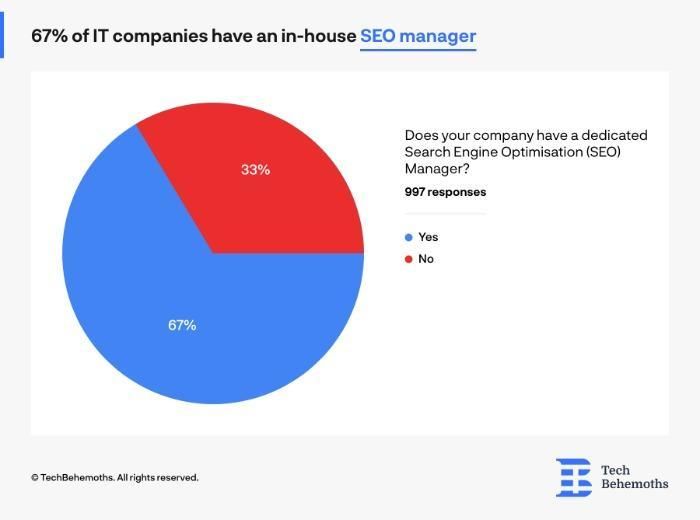
Further, 89.3 percent said they’d conducted an SEO audit in the last year, and perhaps the most telling result of all, 78 percent use SEO for leads.
Whatever sector you’re in, SEO can work for you, getting you fresh leads and improving conversions, and taking your business to the next level.
Conclusion
If you’ve ever wondered whether SEO is a continuous process or a once-off project, this article should leave you with no doubt that you need to keep working on it if you want your SEO to be effective.
There are many factors to consider when optimizing a website. While the necessary changes may vary from site to site, the key to success is continually optimizing for SEO.
New trends and developments, changing search intent, and evolving algorithms are some of the main reasons to consider when developing an effective SEO strategy.
By following best practices and keeping up with the latest trends, you can increase the chances that your site ranks highly on search engine results pages, bringing more visitors and potential customers your way.
What’s the best way to implement and update an effective SEO strategy? Share your tips below.

See How My Agency Can Drive Massive Amounts of Traffic to Your Website
- SEO – unlock massive amounts of SEO traffic. See real results.
- Content Marketing – our team creates epic content that will get shared, get links, and attract traffic.
- Paid Media – effective paid strategies with clear ROI.
Book a Call


/cdn.vox-cdn.com/uploads/chorus_image/image/62810996/Amm_DeepSentinel_01.0.jpg)
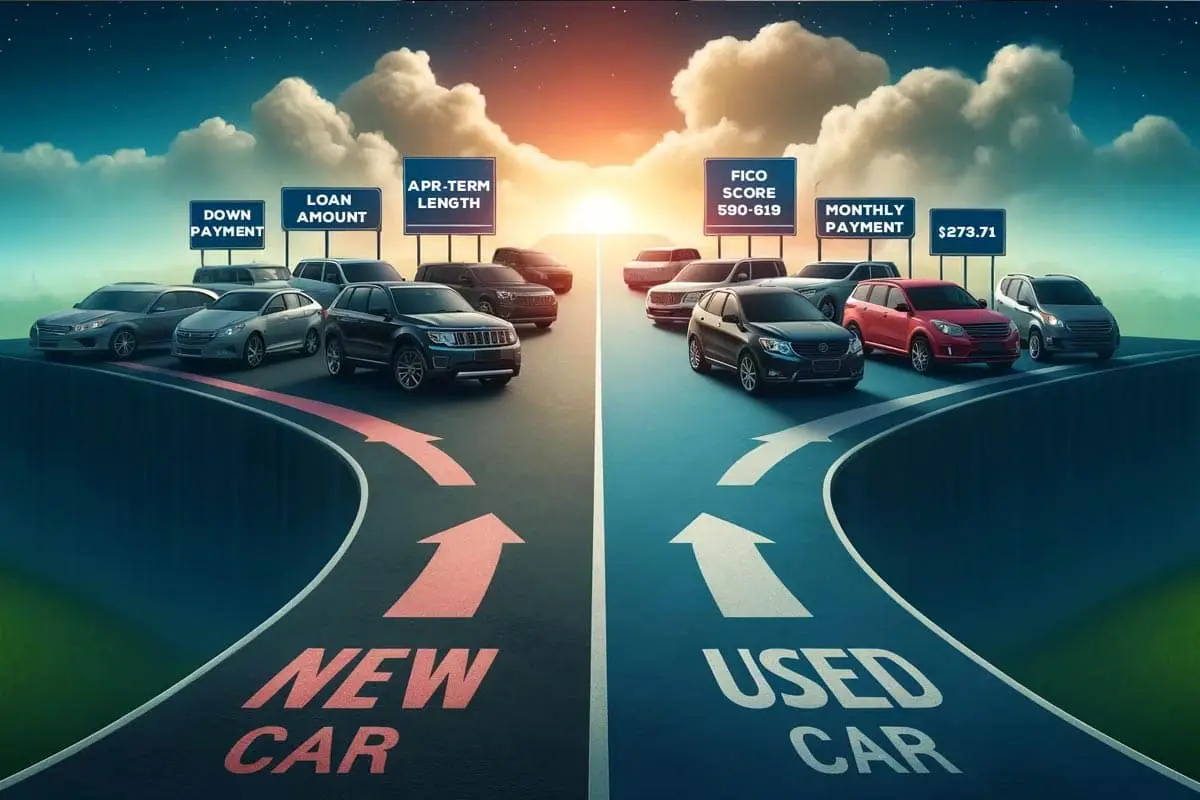
More Stories
RFPIO Appoints DocuSign, Google & Seismic Alumnus As CMO
Gurney Journey: An Improvisational Approach
On The Spot: Linda Albertini